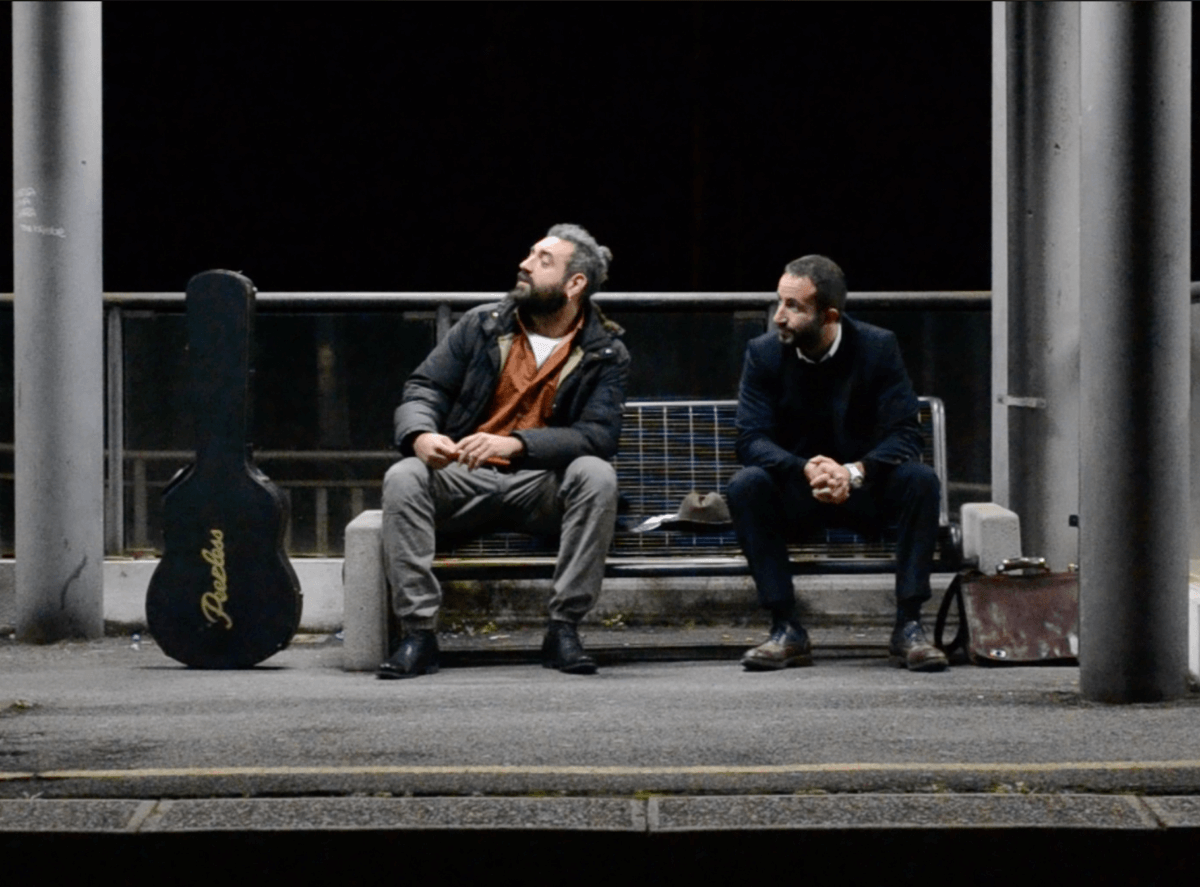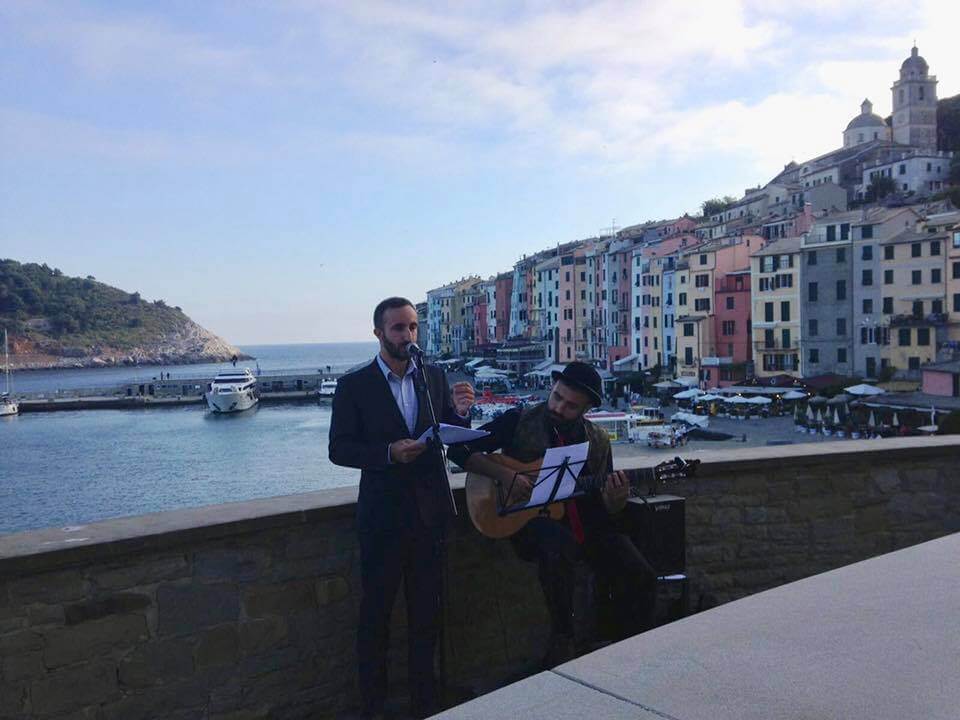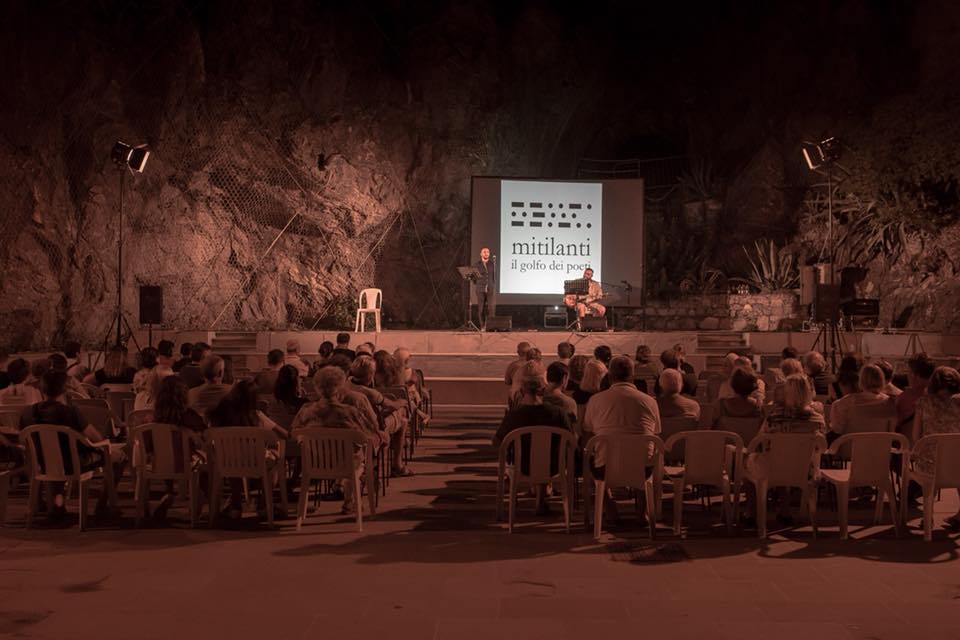Thanks to its idyllic landscapes, the Gulf of La Spezia has attracted artists and writers for centuries, and that’s why it was nicknamed Golfo dei Poeti (Gulf of Poets). But what about today? Is it still a bay for poets? Let’s find out in this interview: Discover Portovenere Blog had the pleasure of chatting about poetry, music and travels with Filippo Lubrano, a versatile Management Engineer, journalist and writer from La Spezia.
You are a business developer and intercultural management trainer, but also a storyteller, performer and writer. Tell us a bit about yourself, particularly about your creative side and its relationship with the Gulf of La Spezia.
It’s always been uneasy to me to explain the two sides of my personality: I guess the creative side has long threatened my credibility in the “rationality” one, and viceversa. It took me some years to embrace both of them, and now it has become my main atout both professionally and performing-wise. After years of traveling and living abroad, mostly in Asia and the US, I came back to my hometown La Spezia where I am part of the collective of poets “Mitilanti”. We use the Bay of Poets as the base of our activities, but we perform everywhere in Italy and sometimes it might happen that you can find me on stage in Paris, London or Bangkok. Having the chance to live in a human-size place helps you in getting the things done faster and easier, so you can focus on your fundamentals. Which to me, now, are basically meditating and writing – and traveling of course!

In your opinion, what is the role of poetry in modern society?
The same as in the former ones: enlightening, and waking up the masses from commodity entertainment. It is now easier than before to access any kind of text, thus it’s also easier to get distracted by the noise that is everywhere. One has to focus and concentrate, and need a lot of drive and motivation, other than talent. I think poets nowadays have to be more eclectic than ever before, in terms of tools one must use mostly. We need to flirt with videos, study music, use social networks to share our views, enrich the conversation. As Majakovskij used to say, “art is not a mirror to hold up to society, but a hammer with which to shape it”.
The relationship between poetry and travel has always been strong, and still is today. You have a show called “Poems for Airports and Railway Stations”. How did you come up with the idea and what is it about?
I mostly write when I travel. I mean, the things I write when I travel, they seem to me more meaningful. My latest novel, Aerial Roots, was entirely written during flights. I think it’s the first book in the world of this kind. I don’t like driving: I love being transported whenever I travel. Because I can double the experience, by traveling and by reading at the same time. It enhances our senses – and it’s the closest you can get to ubiquity. The “Poems for Airports and Railway Stations” show is therefore a way to make the audience travel to the places I’ve been to, without moving from their chair. Which is good, it’s even cheaper than Ryanair – and usually seats are more comfortable. The show is a perfect match between my words and the music by Manuel Picciolo, an important local musician.

An innovative way to promote poetry and music, especially for tourists who know little or nothing of the Gulf of Poets, is the “Tour of the Poets” with Grand Hotel Portovenere. What makes this exclusive tour special?
The Tour of Poets is actually a kind of adaptation of the Poems for Airports and Railway Stations show. It’s a spin-off, called “Poems for Gulfs and Harbours”. It involves different languages: in English, Italian and local dialect. To me, being able to connect tourists and travelers to the local culture is almost an obsession: it all comes from the period I spent in Bangkok. I didn’t understand anything of the language there and I was looking forward to access it so hard that I did my best to attend all the shows and exhibitions I could. The only ones I could actually attend were the ones in English. It was there that I realized how important it is to translate as much as we can of the local identity to an accessible form. It empowers both the local culture and the travelers’ one. Take Cinque Terre: less than 4.000 people live there, and it hosts almost 4 million tourists per year. We need to find a way for the local identity to take advantage of it, not just economically-wise.
The Bay of Spezia is dubbed Gulf of Poets because it inspired countless artists and poets in the past. Still today, it is a hub of creativity, especially for young local artists. Tell us about some of the territory’s artistic projects that you are involved in, such as the Mitilanti Writing Gym and the Poetry Slam.
As Gustav Mahler put it, “Tradition is not the worship of ashes, but the preservation of fire”. I try myself to contribute to this with the Writing Gym, which we’ve been running for 3 years now. Poetry Slams are a way for me to express myself and get in touch with the unexperienced audience: if my writings are able to touch them too, it means it’s something worth sharing. In La Spezia, as a collective of poets we don’t participate to the slams, we just organize them. We want the local community to flourish. And, after 4 years trying hard, I think we almost made it: we created a rock-solid community now, that is the core of our followers. It’s not by chance that the Mitilanti claim is: “It’s still a bay for poets”. That’s how we end up every show we promote.

Any future projects you would like to share?
I have just launched the “Humans of Cinque Terre” project, together with a team of photographers. It’s my way to contribute to the slow-travel movement here. Most of the people come here just to take a selfie with the nice painted house in Manarola, but there’s so much more than that. I try to deliver a scent of the community behind the scenes, so that people might realize that maybe it’s the case to spend a little bit more time in the region. You can find the accounts both on Instagram and Facebook: one day, it’ll become a book.
On top of that, we’re about to launch another project with the Mitilanti team: it will be focused on the relationship between nowadays vision of work and poetry. If you want to keep updated, I just made up a website to cope with my “Creativity squared”: www.filippolubrano.com. I’ll see you there!
Untitled – Bangkok, November 2015
You taught me spirits don’t move
but horizontally, in order to be safe,
all you’ll need is a trivial hurdle
between the sofa and the bedroom, oriented
the way the feng-shui suggests. A Benjarong teapot,
the one from your mother, a carved door
reflecting the multiple aspects the Naga can exist.
We went down to the chalk-stupa temple
the motionless stupas, that allow no livable cavity
on top of Buddha’s relic – a trace of hair, the ultimate nail.
We stared at ourselves as if the lake carps were
about to swallow us, shred our terrestrial meats
apart, to reincarnate in a lower circle,
a rat, a dragonfly, a monitor lizard.
Garuda’s wooden profiles were crutches for the oxygen
of the world, I would have leaned your silk
dress to invert the reproductive process, teach the butterfly
how to come back to the status of a silk worm, that giving your life away
was just not worth it, that no pashmina embroidery
deserves the final act, the one nobody
will narrate – just the latest of the countless ignored miracles.
The image of your neck overwhelmed all
this, the recess between your shoulder blade
and your atlas where your skin twists and stumbles and changes
its color, where I’d pour loads of tiger
balm, the fire of red tiger balm would
burn up to lathe your outline, to soothe
your domestic grieves, with a major blaze.
Considering giving your life away, to be a string
benefitting of your human warmth.
Discover more from Discover Portovenere Blog
Subscribe to get the latest posts sent to your email.